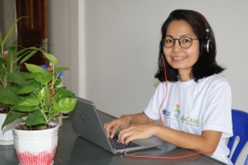
Phany SOK
Program Specialist, Representative Office Of Puls Trading Far East Limited
Course: Master of Employment and Labour Relations Law
University: University of Melbourne
Graduation: 2015
On the 18th of March 2020, Cambodia reached 37 confirmed cases, our office started the conversation on working from home. On 24th of March, I started my first day working from home. I was so excited. I saved more than an hour of commuting time. I got up as usual, had a bath and breakfast, and went straight to work at 7:30 a.m. and had a few breaks in between, but I literally remained in my flat straight working until around 5:40 p.m. I work for H&M Production Office in Cambodia as a social sustainability program responsible, working with around 40 factories in Cambodia which employ thousands of workers, most of whom are women; my role was also upgraded right before the pandemic hit Cambodia in mid-March. Thus, I was so excited about my work: I wanted to perform, I wanted to be part of the solution for these women’s jobs and safety and I wanted to be normal. Nevertheless, I was wrong. This pandemic is unprecedented. I cannot act as normal, as it does not just affect me and my working arrangement. It has affected my siblings, my parents, my colleagues, the stakeholders I work with, the whole Cambodia, and the world. At the night of my first day working from home, I was in a state of confusion and shocked, as to how I could work better the next day.
Starting from someone who are very close to me, my parents. We had agreed that there would be only one time of grocery shopping per week and we did not want to be part of the problem by stocking piles of grocery. Hearing what happened in Wuhan, my parents did the opposite. They went shopping every day to pick up whatever grocery they thought they missed. My brother was in his second month of three-month probationary period at his new workplace. Moving to the important stakeholders in the industry that I work, trade union federations, Ministry of Labor and Vocational Trainings, Better Factory Cambodia, factories, factories’ workers, were somehow also in the confusion mode. When this pandemic hit Europe most of us went into reaction mode. How can we keep this industry alive? How can we keep jobs and wage for these workers? How can we ensure compliance? How can we help these workers to stay safe? Personally, also how can I be efficient with my new role while we are all apart? And will my family and I survive this pandemic?
While physical health is a challenge when working from home, mental health is more a challenge during this pandemic when the future is very cloudy. To overcome my mental challenge, I have spent a lot of time meditate and reflect. First, I had to surrender. This is global pandemic. I cannot fight this alone. While I can do my best, the likelihood of these female workers depends so much on the collaboration of all relevant stakeholders on a bigger scale. Second, I had to understand and accept. My colleagues (my team in particular), my parents and myself are all in this. While we do our best, we need time to adjust. Pushing too hard will just make thing break than better. Third, I have to trust. I have to trust that my team, even though we are a part, do their best to perform their work; and all stakeholders put the interest of the industry and the workers above their personal differences. Fourth, I have to be grateful. I am grateful that I still have a job during this pandemic; I am grateful that there are places around our neighborhood that I can get fresh air while conforming with social distancing. Fifth, I have to stay positive. While the electricity bill has increased when working from home, I can also save from lipstick expense. While this make us apart, it also makes us closer. Now, I have opportunity to join my Melbourne Law School seminar that I have missed for 6 years. For example, this May 14, I joined a session on “Labour law enforcement and COVID-19”, and my Professor John Howe, the former-Director of the Centre for Employment and Labour Relations Law at Melbourne Law School, was the moderator. Seeing him online for the first time after six years brought a smile to my face, “Wow, he looks so old,” in my mind, “but it could be this work from home thing”! Even we are in different jurisdiction, being part of this seminar and hearing the experts discussing challenges in Australia help with my thinking about the situation I am in professionally now and make me feel that we are in this together. Cambodia is not alone. Last but not least, I have to have faith. I have to believe that we will overcome this together. I have to believe that there is always light at the end of a tunnel regardless how dark it is now.
However, to help our brain to have all those positive thinking does not come without skills. I am very early in this stage of learning, but 10 or 15 minutes of regular physical exercise (yoga and/or biking in my case), the same minutes for reflection and the same for breathing exercise before bed have proved helpful for me so far.

Australia Awards Cambodia is managed by Tetra Tech International Development, on behalf of the Australian Government.
QUICK LINKS
CONTACT INFO
Level 2F, PGCT Centre, Preah Sihanouk Blvd, Phnom Penh
Email: info@australiaawardscambodia.org
Tel: +855 12 635 306
Tel: +855 15 301 127